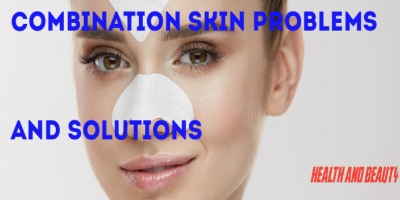Combination skin is one of the most challenging skin types for its owner, as it combines dry and oily skin, so what is the combination skin?
Do you notice that your skin is oily with large pores on the face, and is dry and flaky at the same time? Do not worry about that, these signs indicate mixed skin, so what is this skin? How do you deal with it?
What is combination skin?
Combination skin is defined as a combination of dry skin and oily skin, and if you draw a big T on your face, all the skin under the T is likely to be oily, while the areas outside it are dry, so the term (T) is used T-zone) when indicated for combination skin.
Combination skin means that you may have lines, wrinkles, and clogged pores at the same time, and you often also suffer from uneven skin tone or large pores on your nose, and of course, this combination of characteristics and problems can make it very difficult to deal with.
What are the causes of mixed skin?
Regardless of your skin type — dry, oily, combination, or sensitive — it's probably inherited from your parents or grandparents, just as you inherit eye color, hair color, and body type.
Usually, combination skin contains many sebaceous glands, especially in the areas of the nose, chin, and forehead, and this makes it more prone to clogged pores, while in the areas of the cheeks there are fewer sebaceous glands, thus appearing dry and flaky.
In some cases, combination skin is caused by using harsh products that contain drying ingredients, such as sulfur and alcohol, which encourage the skin to produce more oil in the T-zone.
What are the signs of mixed skin?
Among the symptoms that indicate that the skin type is mixed skin:
- Cheeks are dry and flaky.
- The presence of crust in the scalp, especially in women.
- Pore clogging and glossiness in the T-zone.
Combination skin tips
Always remember that your skin is a mixture of dry and oily skin, for example, when you use solutions with ingredients that absorb oils in the oily area, you will cause problems in the dry area, and vice versa, so you should keep things separate, and follow the following tips in treating mixed skin problems, including:
- Use a skin cleanser to effectively remove impurities and cosmetics without leaving your skin too dry or greasy.
- Use exfoliators, as they are a wonderful and gentle solution on the skin to get rid of dead skin naturally. Because this contributes to reducing oily skin, narrowing the pores in the T-zone, and softening them.
- Apply skin nutrients to the dry area, then apply sunscreen on top.
- Use a Dead Sea Mud Mask to purify your pores naturally without drying, but choosing a mask can be difficult; This is because you're not sure if you should get a product that absorbs oils or adds extra hydration.
- Use a nighttime moisturizer that contains antioxidants and skin rejuvenating and restoring ingredients to keep the skin calm and reduce excess oil on its surface.
- Try to moisturize your skin from the inside out, by eating foods that contain essential fatty acids, such as salmon, walnuts, and flaxseeds, and taking fish oil.
- Exercising regularly may help in naturally high blood pressure, thus delivering nutrients to cells more efficiently to the skin.
Things to avoid for combination skin
You should avoid many factors and influences that increase the problems of mixed skin, the most important of which are:
1. Avoid harsh detergents
Be careful not to use cleansers that contain sulfates or alcohol, as they strip your skin of its natural oils, and you may think that this benefits the oily part of your skin, but in fact, it increases the production of sebum.
2. Stay away from stress
You may be surprised by the relationship of stress with improving your mixed skin, but it was found that stress may increase the interaction and activity of oily and dry areas, so try to calm your nerves by practicing meditation and yoga exercises.
3. Do not use pore-clogging products
There are many skincare and makeup products that contribute to the formation of combination skin, including moisturizers that contain fatty materials, such as mineral oils in moisturizers, and foundation creams.
4. Avoid strong aromatic odors
Your cheeks are likely to be prone to dryness, dullness, and soreness, and maybe more prone to irritation, so avoid products with chemical fragrances and other skin-irritating ingredients.
5. Beware of the sun's rays
Your skin of any kind needs protection from the environment especially from UV rays, so we suggest you wear hats and try to stay in the shade, and use sunscreen.
6. Avoid strong disinfectants
Try to choose mild types of cleansers that are meant for combination skin.

Comments
Post a Comment